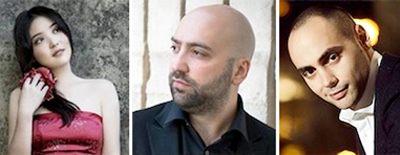by Daniel Hathaway

Only seven pianists are invited to participate each year in the Lake Como program, whose atmosphere is described as “more familial than that of an academy, and communal rather than competitive.” Participants live in a 17th-century palazzo overlooking the famous lake, and distinguished pianists make visits to give private lessons and master classes. In the first phase of the partnership, Oberlin-Como Fellows Luca Buratto (Italy) and David Bekker (Hungary) recently arrived at Oberlin to study with Conservatory faculty, as well as with Lake Como teachers during four, week-long residencies on campus each year.
Their performances on Sunday evening showed Ran Jia, Alessandro Deljavan, and Marcos Madrigal to be master purveyors of their craft, and the repertoire they selected for their mini-recitals (separated by 10-minute intermissions) seemed perfectly matched to their individual musical personalities.
First up, Chinese-born Ran Jia played Franz Schubert’s Sonata in c minor, Opus Posthumous, perhaps the most compact of the composer’s last three extended piano works. Her elegant touch brought out Schubert’s lyrical lines and elucidated his more complicated textures. Well-voiced pianissimos and fortes distinguished the slow movement, and confident, steady rhythms underlined the tricky cross-hand gestures in the concluding tarantella. Exuding poise at the keyboard, Ran Jia looked as though she were completely enjoying herself, frequently smiling at Schubert’s more engaging nuances.
Frédéric Chopin’s two sets of Études provide pianists with thorny technical problems to solve — and piano competition juries with a handy way of judging where contestants weigh in on the virtuosity scale. Italian pianist Alessandro Deljavan (who is half-Persian on his father’s side) chose to play the Opus 25 Études in their entirety and in the order of their publication, which in Chopin’s case makes good musical sense. While Deljavan easily met their digital challenges, he also made the twelve studies real, tangible pieces of music, from the graceful A-flat “Aeolian Harp” Étude to the tumultuous c-minor “Ocean” scene that closes the set — titles not by Chopin!
Expertly layering the more complicated studies — inner voices came out clearly in No. 2 (“Bees”) — and making something musically coherent and expressive out of the thundering octaves of No. 10, Deljavan even added a bit of vocalization to the more lyrical pieces. Only No. 11, the infamous “Winter Wind” Étude, gave him a few problems toward the end when the left-hand material grew blurry.
Twelve of Alexander Scriabin’s Opus 11 Preludes gave Cuban pianist Marcos Madrigal the opportunity to introduce himself to the audience through music of engaging warmth — and a bit of virtuosity as well. His fluent arm motions only added to the stylishness of his playing.
Prokofiev’s Sonata No. 7, Op. 83 inhabits an entirely different musical realm, visiting two opposing emotional polarities in the first movement, descending from lyricism into tragedy in the second, and bursting into a riotous toccata in an odd meter at the end. Madrigal played with both passion and control, bringing his portion of the concert — and the entire evening — to a formidable conclusion.
Published on ClevelandClassical.com October 5, 2015.
Click here for a printable copy of this article



